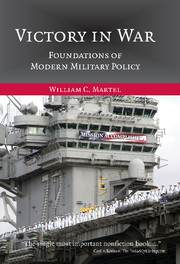Book contents
- Frontmatter
- Contents
- Acknowledgments
- 1 Introduction
- 2 Historical Origins of Victory
- 3 Modern Origins of Victory
- 4 Foundations of Victory
- 5 America's Theory of Victory
- 6 1986 Raid on Libya
- 7 1989 Invasion of Panama
- 8 1991 Persian Gulf War
- 9 Bosnia and Kosovo, 1992–1999
- 10 2001 Invasion of Afghanistan
- 11 2003 Invasion of Iraq
- 12 Military Power and Victory
- 13 Conclusions
- Notes
- Index
6 - 1986 Raid on Libya
Published online by Cambridge University Press: 05 June 2012
- Frontmatter
- Contents
- Acknowledgments
- 1 Introduction
- 2 Historical Origins of Victory
- 3 Modern Origins of Victory
- 4 Foundations of Victory
- 5 America's Theory of Victory
- 6 1986 Raid on Libya
- 7 1989 Invasion of Panama
- 8 1991 Persian Gulf War
- 9 Bosnia and Kosovo, 1992–1999
- 10 2001 Invasion of Afghanistan
- 11 2003 Invasion of Iraq
- 12 Military Power and Victory
- 13 Conclusions
- Notes
- Index
Summary
On the evening of April 15 and the morning of April 16, 1986, the United States launched a military raid using air strikes to destroy several political leadership and military targets in the Libyan cities of Tripoli (the capital) and Benghazi. These were selected because of their direct connection to the Libyan government which was directly and actively supporting terrorist activities against the United States and its allies. The specific provocation for this raid was to retaliate against Libya for its involvement in a terrorist attack in West Berlin that killed one U.S. serviceman and wounded several other Americans. This military raid was conducted with about a hundred Air Force and Navy aircraft, including bombers, electronic countermeasures (ECM) aircraft, air defense, and tankers for aerial refueling. This chapter discusses this close series of air strikes, known as Operation El Dorado Canyon, in terms of its implications for victory.
Operation El Dorado Canyon is unique among the case studies in this book because it was essentially a small-scale military raid. Yet this intervention, conducted toward the end of the cold war, contains important lessons regarding the use of military power against a so-called rogue state and its implications for theories of victory. Since this military attack against Libya was conducted largely in retaliation for terrorist attacks that had been launched against the United States and its allies, this raid has significant implications for what it means to achieve victory at a time when America is involved in the global war against terrorism. In the aftermath of the attacks of September 11, 2001, the 1986 attack against Libya highlights the use of military power to achieve victory when the state is restrained (as it was during the then-ongoing cold war) from using military force on a massive scale.
- Type
- Chapter
- Information
- Victory in WarFoundations of Modern Military Policy, pp. 149 - 163Publisher: Cambridge University PressPrint publication year: 2006



